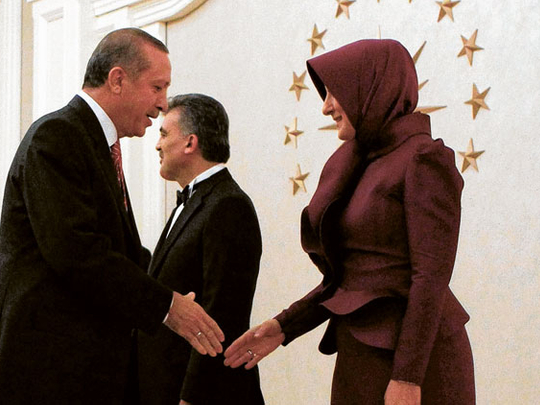
Ankara: On Turkey's anniversary celebrations, all eyes were on the head of the president's wife.
In a gesture that strikes at the heart of a wrenching debate over secularism and piety, Hayrunnisa Gul wore an Islamic headscarf at a reception Friday marking the founding of modern Turkey by Mustafa Kemal Ataturk — whose secular principles are revered by the nation's traditional establishment with almost religious fervour.
Across town, at around the same time, the military — which sees itself as the guardian of Ataturk's legacy — held its own Republic Day fete in a scheduling conflict symbolic of the divide between the elected, Islamic-leaning government and opponents who fear secular ideals are in peril.
The maroon attire of President Abdullah Gul's wife as she greeted guests at the pink-walled presidential palace may have struck outsiders as trivial, and it was not the first time she had done so. But for people on both sides of the philosophical split, the sight of an Islamic headscarf at the palace where Ataturk once lived, and which is seen as a symbol of the secular bedrock of Turkey's constitution, was a highly emotive sign of changing times.
The reception marking the 87th anniversary of Turkey's establishment also amounted to a coming out party for the president's wife, who normally wears a headscarf and has mostly kept a low profile since her husband got the job in 2007 despite a warning from the military that his election would endanger secularism, stirring fears of a coup.
It was also a measure of how Muslim Turkey is changing under devout civilian leaders who have stripped the generals of much of their political power.
"It's just another sign of this very long transition. There are deep-rooted fears, suspicions, in society and they tend to spill over into politics," said Gulnur Aybet, a professor of international relations at the Izmir University of Economics in Turkey and a senior lecturer at the University of Kent in Britain.
Explosive issue
The headscarf is an explosive issue in Turkey, where government supporters view it as an essential emblem of piety, and opponents see it as an ominous symbol of political Islam.
Female students and civil servants are barred from wearing it in schools and offices, but many universities have relaxed the ban under a government that says the rules deprive devout women of the right to jobs and education.
The debate touches on broader issues about the direction of conflicted yet increasingly confident Turkey, a regional power and Nato member that asserts its outreach to Iran and harsh criticism of Israel do not mean it is turning away from Cold War-era alliances with the West. Turkey, struggling to join the European Union, has become a freer, richer place during the 8-year tenure of Prime Minister Recep Tayyip Erdogan, but he has been unable to shake a minority's suspicions that he is steering the country toward an Islamic way of life.
The internal tensions have eased to the point where Gul is only now comfortable holding a single Republic Day reception with his wife in attendance. To skirt confrontation on past Republic Days, he held two receptions _ a midday one at which military officers and other VIPs gathered without wives, and one in the evening, during which women in headscarves were commonly seen, and which the secular elites normally shunned.
Scheduling conflict
This time around, a scheduling conflict stirred speculation that hardline secularists were searching for an excuse to send regrets to the president. The military held a reception at 7pm on Friday. The president's celebration began at 7.30pm, and the generals didn't make the trip to Cankaya Kosku, as the palace is called in Turkish.
The leader of the main opposition group did not attend the presidential reception.












